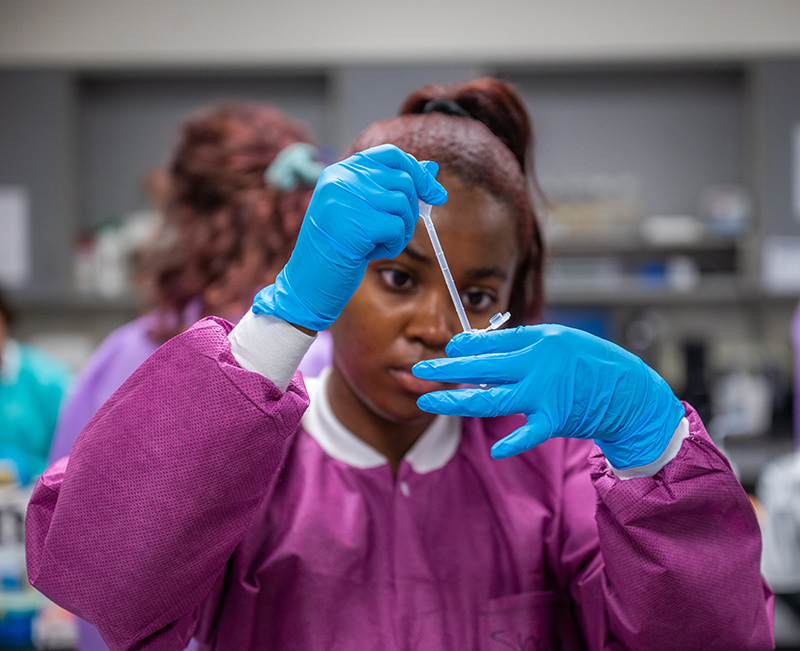Essential Functions
The National Accrediting Agency for Clinical Laboratory Sciences requires essential functions required for program admission to be clearly defined, published, and provided to prospective students and made available to the public. A CLS student at Augusta University is expected to meet the following requirements.
Technical Requirements
- Perform laboratory manual, semi-automated, and automated procedures in which biologicals* (e.g., blood and other body fluids, culture materials, tissue sections, and cellular specimens) are tested for their biochemical, hematological, microbiological, and immunologic components.
- Characterize the color, odor, clarity, and viscosity of biologicals, reagents, or chemical reaction products.
- Employ a clinical grade binocular microscope to discriminate among fine structural differences of microscopic specimens.
- Read and comprehend text, numbers, and graphs displayed in print and on a computer screen.
- Use a computer/electronic keyboard to operate laboratory instruments and to calculate record, evaluate, and transmit laboratory information.
Movement Requirements
- Move freely and safely about a laboratory.
- Reach laboratory bench tops and shelves, patients lying in hospital beds or patient seated in specimen collection furniture.
- Travel to numerous clinical laboratory sites for practical experience.
- Perform moderately taxing continuous physical work, often requiring prolonged sitting or standing, over several hours.
- Maneuver phlebotomy and culture acquisition equipment to safely collect valid laboratory specimens from patients.
- Control laboratory equipment (e.g. pipettes, inoculating loops, test tubes) and adjust instruments to perform laboratory procedures.
Intellectual Requirements
- Possess these intellectual skills; comprehension, measurement, mathematical calculation, reasoning, integration, analysis, comparison, self-expression, and criticism.
- Solve problems and think critically.
- Exercise sufficient judgment to recognize and correct performance deviations.
- Critically evaluate her or his own performance, accept constructive criticism, and strive to improve performance (e.g. participate in enriched educational activities).
Communication Requirement
- Read and comprehend technical and professional materials (e.g. textbooks, magazines, journal articles, handbooks, and instruction manuals)
- Follow verbal and written instructions in order to correctly and independently perform laboratory test procedures; Be able to hear (some level of hearing is required because the student must be able to perceive and timely respond to significant sounds in a clinical lab, such as signals generated from instrumentation that may indicate normal operating status, critical sample value, or equipment malfunction.
- Clearly instruct patients prior to specimen collection.
- Effectively, confidentially, and sensitively converse with patients regarding laboratory tests.
- Maintain patient confidentiality at all times.
- Evaluate the performance of fellow students, staff, and health care professionals verbally and in a recorded format (writing, typing, graphics, or telecommunications).
- Use computer software (word processor, spreadsheet, database, information systems), and the internet for communication, education, and professional purposes.
- Independently prepare papers, prepare laboratory reports, and take paper, computer, and laboratory practical examinations.

Behavior and Professional Requirements
- Dress to project a neat, well-groomed, professional appearance.
- Behave in a professional manner toward fellow students, faculty, and patients; Exhibit attitude, integrity, communication, motivation, independence/leadership, self-worth assessment and altruism which meet and exceed the expectations of a health care professional.
- Manage the use of time and systematize actions in order to complete professional and technical tasks within realistic constraints.
- Possess the emotional health necessary to effectively employ intellect and exercise appropriate judgments.
- Provide professional and technical services while experiencing the stresses of task-related uncertainty (e.g. ambiguous test ordering, ambivalent test interpretation), emergent demands (e.g. “stat” test orders), and a distracting environment (e.g. high noise levels, crowding, complex visual stimuli).
- Be flexible and creative and adapt to professional and technical change.
- Recognize potentially hazardous materials, equipment, and situations and proceed safely in order to minimize risk of injury to patients, self, and nearby individuals.
- Adapt to working with potentially infectious specimens, a variety of chemicals, and biological agents.*
- Support and promote the activities of fellow students and of health care professionals.
- Help foster a team approach to learning, task completion, problem solving, and patient care.
- Be honest, compassionate, ethical, responsible, and forthright about errors or uncertainty.
* Students/individuals with special health concerns (e.g. immunocompromised, allergic) may put their health at risk when working in the clinical laboratory due to the agents (infectious/biological and chemical) that are handled in all areas of the laboratory.
It is the responsibility of the student to request accommodations due to disabilities. However, the student must be able to carry out the essential functions listed above.
Adapted from:
- Fritsma, G.A., Fiorella B. J., and Murphey, M. Essential Requirements for Clinical Laboratory Science. Clinical Laboratory Science 1996. Vol. 9, pp 40-43.
- Russell BL, Owen M., Leibach EK, Stone RB, Meaders E., Kraj, B. Capturing Professionalism in Pre-Service Education: Professionalism Tool Development and Implementation. Clinical Laboratory Science, 2011.24(4): Suppl pp 4-11.
Updated February 28, 2012